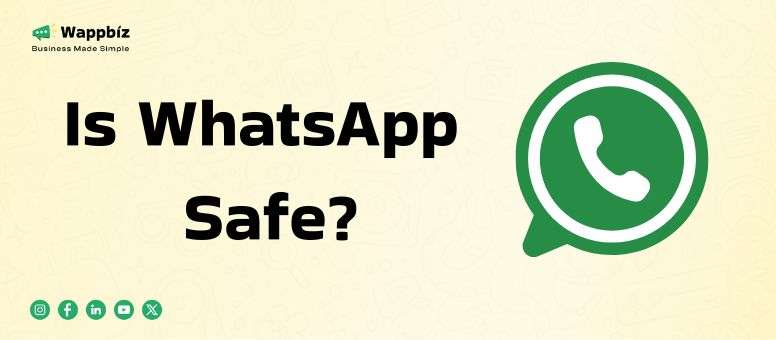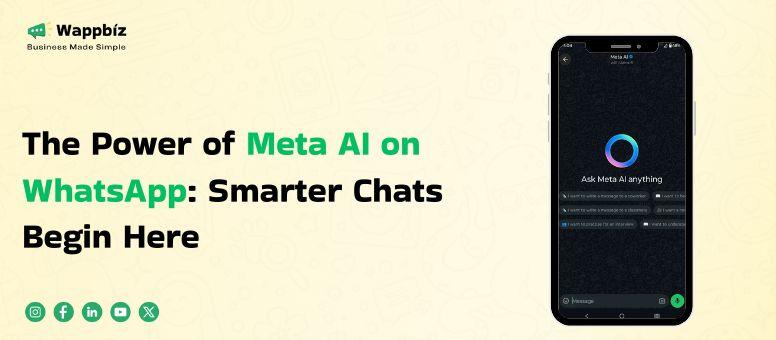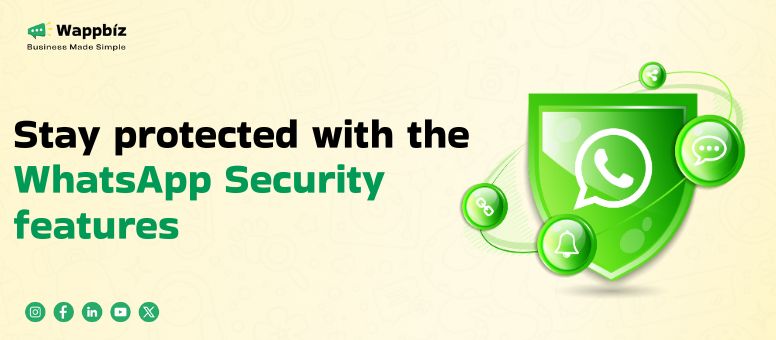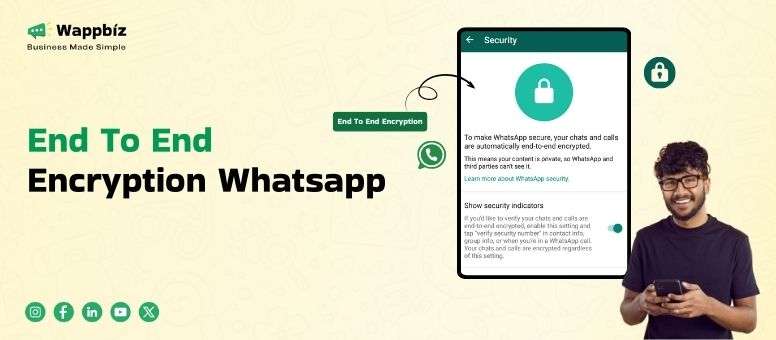With over 2 billion users worldwide, WhatsApp is one of the most popular messaging apps. But with growing concerns about data privacy and online security, many users are asking, ‘Is WhatsApp safe from hackers?’ In this article, we’ll explore WhatsApp’s security features, potential risks, and how it compares to other messaging platforms in 2025.
How Safe Is WhatsApp in 2025?
WhatsApp remains a secure messaging platform in 2025, thanks to WhatsApp end-to-end encryption, two-step verification (2FA), and AI-driven fraud detection. It prevents unauthorized access, protects messages, and enhances privacy controls. However, Meta’s data-sharing policies and government surveillance requests raise concerns about metadata privacy.
Businesses must use the official WhatsApp Business API to avoid security risks from third-party tools. This ensures the WhatsApp business account is safe from unauthorized access and fraud. Cloned apps and phishing scams remain threats, making caution essential. To stay safe, users should enable 2FA, review privacy settings, and download WhatsApp only from official sources. While WhatsApp is secure, responsible usage is key to protecting data and accounts. However, how safe is WhatsApp in 2025? Let’s break it down:
WhatsApp Security Features in 2025
WhatsApp security features continue to strengthen in 2025, ensuring that user data remains private and protected from unauthorized access. Here’s a detailed look at the latest security features designed to safeguard conversations and user accounts:
1. End-to-End Encryption
WhatsApp ensures that all messages, voice calls, and video calls are protected with end-to-end encryption. This means that only the sender and the recipient can read the messages—not even WhatsApp or any third party can access them. This feature applies to individual and group chats, making sure that every communication remains private and secure.
2. Two-Step Verification
For additional account security, WhatsApp provides two-step verification, which requires users to set up a PIN that is needed when logging in from a new device. This prevents unauthorized access, even if someone manages to obtain the account’s credentials.
3. Disappearing Messages
WhatsApp users can now send disappearing messages, allowing messages to automatically delete after a set period (24 hours, 7 days, or 90 days). This feature enhances privacy by ensuring that messages don’t remain on devices indefinitely.

4. Locked Chats
A new security enhancement, Locked Chats, lets users protect specific conversations with a password, fingerprint, or Face ID. Locked chats are stored in a separate folder, ensuring that private messages stay confidential even if someone gains access to the device.
5. Security Notifications
WhatsApp alerts users whenever a contact’s security code changes. This ensures that users are always aware of potential security risks, particularly when engaging in sensitive conversations.
6. Device Protection
To prevent unauthorized access, WhatsApp now includes device protection features that detect suspicious login attempts. If an unusual login occurs, users receive a real-time notification prompting them to verify their identity before any unauthorized access can take place.
With these enhanced security features in 2025, WhatsApp continues to provide a safe and private communication experience for its users, ensuring protection against cyber threats, unauthorized access, and privacy breaches.
WhatsApp Security Risks in 2025
WhatsApp continues to improve its security with end-to-end encryption, two-factor authentication (2FA), and regular updates. However, certain vulnerabilities and risks still persist in 2025. Here’s a breakdown of the major security concerns users should be aware of:
Phishing Scams
Cybercriminals use deceptive messages, often disguised as official WhatsApp communications, to trick users into revealing sensitive information such as login credentials, bank details, or OTPs. These scams may come in the form of fake verification messages, job offers, or fraudulent customer support interactions.
How to Stay Safe
- Avoid clicking on suspicious links or providing personal details.
- Always verify messages claiming to be from WhatsApp or banks.
- Enable 2FA to add an extra layer of protection.
Malware Attacks
Malicious links and attachments sent via WhatsApp can install spyware, keyloggers, or trojans on a user’s device, compromising their security. Pegasus spyware, for example, has previously exploited vulnerabilities in messaging apps like WhatsApp.
How to Stay Safe
- Do not download files or click links from unknown sources.
- Keep WhatsApp and your phone’s OS updated.
- Install trusted antivirus software to detect threats.
Third-Party WhatsApp Apps
Unauthorized versions of WhatsApp, such as GB WhatsApp or FM WhatsApp, offer extra features but pose serious security risks. These apps are not monitored by WhatsApp’s official security team and may contain malware, spyware, or backdoors that expose users’ private data.
How to Stay Safe
- Avoid installing unofficial WhatsApp versions.
- Use only the official WhatsApp app from Google Play or the App Store.
Cloud Backup Vulnerabilities
WhatsApp messages are end-to-end encrypted, meaning only the sender and receiver can read them. However, when users enable cloud backups on Google Drive or iCloud, the encryption may not always be maintained, making backups vulnerable to hacking or government access.
How to Stay Safe
- Turn on end-to-end encrypted backups in WhatsApp settings.
- Regularly delete old backups to reduce exposure.
- Store sensitive data in secure offline storage instead of chat backups.
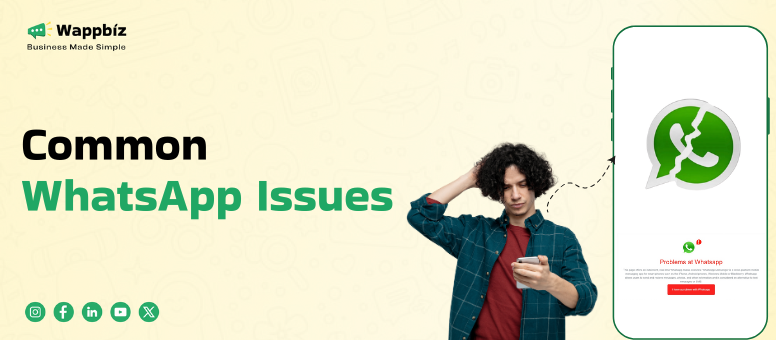
Is WhatsApp Safe for Kids?
Parents often wonder, “Is WhatsApp safe for kids?” The app is widely used by teenagers, but safety concerns include exposure to strangers, cyberbullying, and inappropriate content. Parents can improve security by:
- Enabling privacy settings to limit who can contact their child.
- Teaching kids not to share personal information.
- Using parental control apps to monitor activity.
Is Telegram Safer Than WhatsApp?
A common debate in 2025 is: Is Telegram safer than WhatsApp? While both apps offer encryption, Telegram has Secret Chats that provide self-destructing messages. However, WhatsApp’s default end-to-end encryption is considered more secure than Telegram’s standard chats, which are not encrypted by default.
Is It Safe to Share WhatsApp QR Code?
Many users share their WhatsApp QR codes to connect easily. But is it safe to share WhatsApp QR code? While it’s a convenient feature, it comes with risks:
- Scammers can use QR codes to impersonate users.
- If posted publicly, anyone can add you to unwanted groups.
- Always verify who you’re sharing your QR code with to prevent misuse.
Is WhatsApp Safe from Hackers on Android?
Android devices are more vulnerable to malware compared to iOS. Is WhatsApp safe from hackers on Android? While WhatsApp itself has strong security, users must take precautions:
- Avoid downloading apps from unknown sources.
- Enable Google Play Protect to scan for harmful apps.
- Keep WhatsApp and your device’s software updated.
- Never open suspicious links or attachments.
- Enabling two-step verification
How Safe Is WhatsApp End-to-End Encryption?
WhatsApp’s end-to-end encryption is one of its strongest security features. But how safe is WhatsApp end-to-end encryption?
- Messages are scrambled so that no third party can access them.
- Not even WhatsApp, governments, or hackers can read encrypted chats.
- However, if a hacker gains access to your phone, they can read your messages.
7 Ways for Businesses to Use WhatsApp Safely
For businesses, WhatsApp offers powerful tools for customer engagement, but security should be a priority. Here are some ways businesses can use WhatsApp safely:
1. Enable Two-Step Verification
Two-step verification adds an extra layer of security to prevent unauthorized access to your WhatsApp Business account. This feature requires a six-digit PIN whenever someone tries to log in, protecting your business from hacking attempts.
How to Enable It:
- Go to WhatsApp Settings → Account → Two-Step Verification
- Set a strong PIN and an email backup to recover access if needed.
2. Use the Official WhatsApp Business API with WappBiz
Avoid using unauthorized third-party apps that claim to provide WhatsApp business features. These apps may compromise data security and violate WhatsApp’s policies, leading to account suspension.
WappBiz offers a secure and verified WhatsApp Business API solution, enabling businesses to:
- Send bulk messages safely and legally
- Automate customer interactions with chatbots
- Integrate WhatsApp with CRM tools for seamless management
Get started with WappBiz for safe and effective WhatsApp marketing!
3. Limit Employee Access to Business Accounts
To prevent unauthorized access, ensure that only designated employees handle business conversations.
Best Practices:
- Assign role-based access to limit who can send messages or access customer data.
- Use a multi-device feature carefully, ensuring business accounts are not misused.
- Track conversations with a centralized dashboard (available with WappBiz).
4. Verify Customer Identities Before Sharing Sensitive Data
Before sharing confidential business information, always verify customer identities to prevent scams and phishing attempts.
Steps to Stay Safe:
- Use official verification methods like OTPs or secure logins.
- Cross-check customer details with existing databases before processing transactions.
- Be cautious with suspicious messages requesting financial or personal data.
5. Monitor Automated Messages & Chatbots
While automation makes WhatsApp marketing efficient, businesses must ensure that chatbot responses follow privacy guidelines and industry regulations.
How to Manage Automation Securely:
- Regularly review automated messages to prevent incorrect or misleading responses.
- Set up human escalation for complex queries requiring personal assistance.
- Avoid sending spammy promotional content to maintain compliance.
6. Educate Employees on Security Best Practices
Many data breaches happen due to human error. Training employees on safe messaging practices can reduce security risks.
Key Training Topics:
- Identifying phishing scams and fraudulent messages
- Safe handling of customer data
- Understanding WhatsApp’s policies to avoid violations
7. Keep Business Accounts Secure
Securing your business account is essential for preventing cyber threats.
Security Checklist:
- Use a strong, unique password for business devices.
- Update WhatsApp regularly to patch security vulnerabilities.
- Avoid using personal numbers for business communication.
Final Verdict: Is WhatsApp Safe to Use?
So, is WhatsApp safe to use? Yes, but only if you take the right precautions. While the app provides strong encryption and privacy settings, users should:
- Enable two-step verification.
- Avoid sharing personal information publicly.
- Be cautious of scams and phishing attacks.
- Keep their device secure with antivirus software.
Conclusion
While WhatsApp is among the safest messaging apps, users must be aware of potential security threats. By using WhatsApp’s end-to-end encryption and enabling two-step verification, you can keep your account safe from hackers and unauthorized access. By leveraging its latest security features in 2025, using strong passwords, and avoiding suspicious links, you can enjoy a secure and private messaging experience.
For ultimate privacy, always stay updated on the latest WhatsApp security issues 2025 and use the recommended security settings to protect your data!

FAQ’s
Can WhatsApp messages be hacked?
While WhatsApp uses end-to-end encryption, if your device is compromised (e.g., through malware or phishing), hackers can access your messages.
Is it safe to link WhatsApp to other devices?
Using WhatsApp Web or multi-device support is generally safe, but always log out from unknown devices and avoid using public computers.
Does WhatsApp share my data with Facebook?
WhatsApp shares some metadata with Facebook for business and advertising purposes, but message content remains encrypted.
What should I do if my WhatsApp account is hacked?
Immediately log out of all devices, enable two-step verification, and contact WhatsApp support to recover your account.
Is WhatsApp safer than SMS for messaging?
Yes, WhatsApp is safer than SMS because SMS messages are not encrypted, making them vulnerable to interception.
Can someone see my WhatsApp messages from another phone?
No, unless they have physical access to your device or have installed spyware.
How do I protect my WhatsApp account?
Enable two-step verification, use a strong password, and avoid clicking on unknown links.
Is it safe to use WhatsApp for banking?
Avoid sharing sensitive banking details over WhatsApp, even with encryption enabled.
Can I get scammed on WhatsApp?
Yes, phishing scams and fake job offers are common. Always verify messages before responding.

